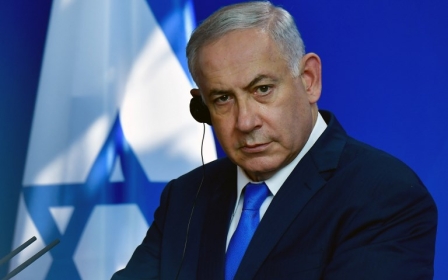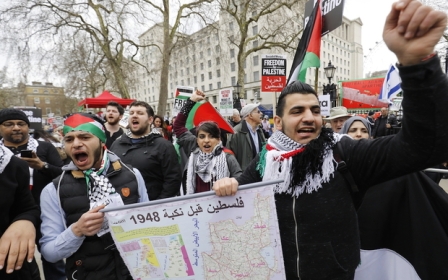European politicians lobbied to declare BDS tactics against Israel as anti-Semitic
An Israeli-backed conference in Brussels will urge all European parties to define boycott, divestment and sanctions (BDS) tactics as “fundamentally anti-Semitic”.
The BDS movement, inspired by the anti-apartheid movement in South Africa, seeks to pressure Israel into ending its decades-long occupation of the West Bank and East Jerusalem, lifting the siege of Gaza, and affording Palestinians equal rights.
Ahead of the European elections in May, the conference seeks to convince political hopefuls and parties to sign up to a document that draws “red lines”, including one that declares BDS activities to be anti-Semitic.
The article targeting the BDS movement is inspired by a resolution adopted in 2016 by German Chancellor Angela Merkel’s Christian Democratic Union.
Another article of the document that European politicians and parties are being urged to ratify is an adoption of the whole International Holocaust Remembrance Alliance’s definition of anti-Semitism.
The full version of the IHRA definition has been decried by Palestinians as a way of silencing criticism of Israeli policy by declaring anti-Semitic calling the State of Israel a racist endeavour.
Detractors say this does not allow fair discussion of the events surrounding the creation of Israel, where 700,000 Palestinians were forced from their homes in modern-day Israel in a process likened to ethnic cleansing.
State-sponsored
Zeev Elkin, Israel’s Jerusalem minister, is at the conference tasked with lobbying the Europeans. The European Jewish Association, which is organising the conference for 6-7 November, says that the Israeli foreign ministry is also involved.
Since the BDS movement was founded in 2005, its popularity and affect has grown.
In turn, Israel has increasingly sought to muzzle it, and in March passed a law barring BDS supporters from entering the country or occupied Palestine.
Earlier this month, US student Lara Alqasem, who is of Palestinian decent, was banned from entering Israel after landing at Tel Aviv’s Ben Gurion airport after being accused of supporting the BDS movement.
She was detained for two weeks until the decision was overturned by the Israeli supreme court.
Also this month, two pro-Palestine activists from New Zealand were ordered to pay $12,000 damages after writing an open letter to musician Lorde urging her to cancel a concert in Tel Aviv, which the artist then did.
Justine Sachs and Nadia Abu Shahab, who both live in New Zealand, have refused to pay, instead using the exposure to raise money for mental health in the Gaza Strip.
New MEE newsletter: Jerusalem Dispatch
Sign up to get the latest insights and analysis on Israel-Palestine, alongside Turkey Unpacked and other MEE newsletters
Middle East Eye delivers independent and unrivalled coverage and analysis of the Middle East, North Africa and beyond. To learn more about republishing this content and the associated fees, please fill out this form. More about MEE can be found here.




